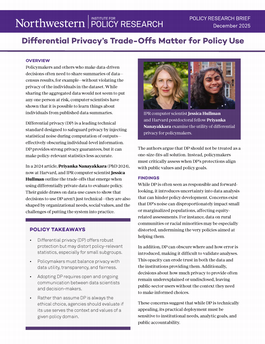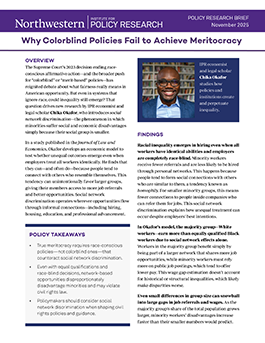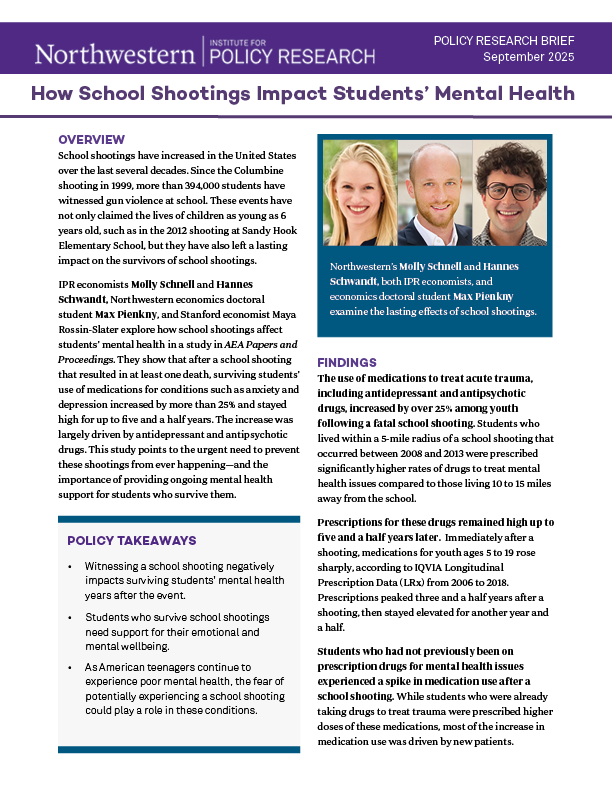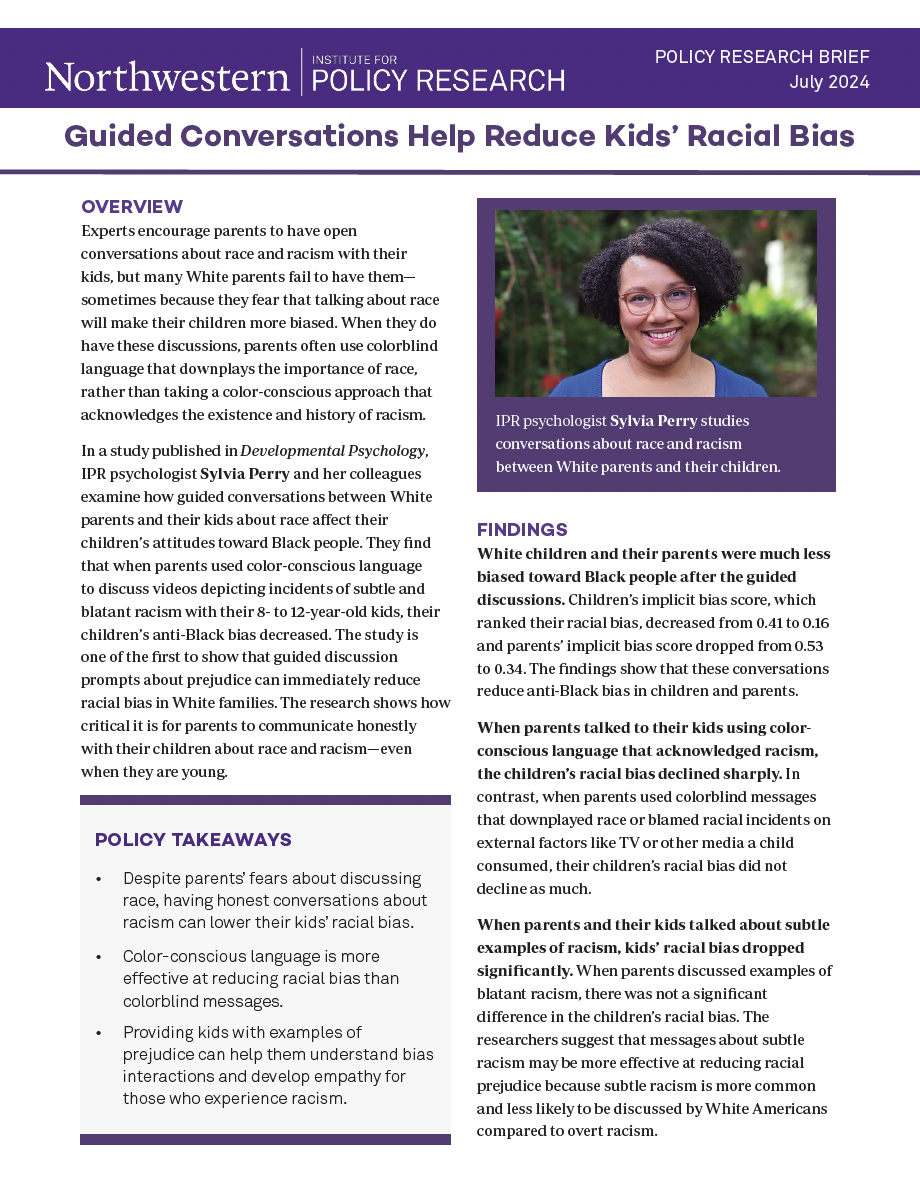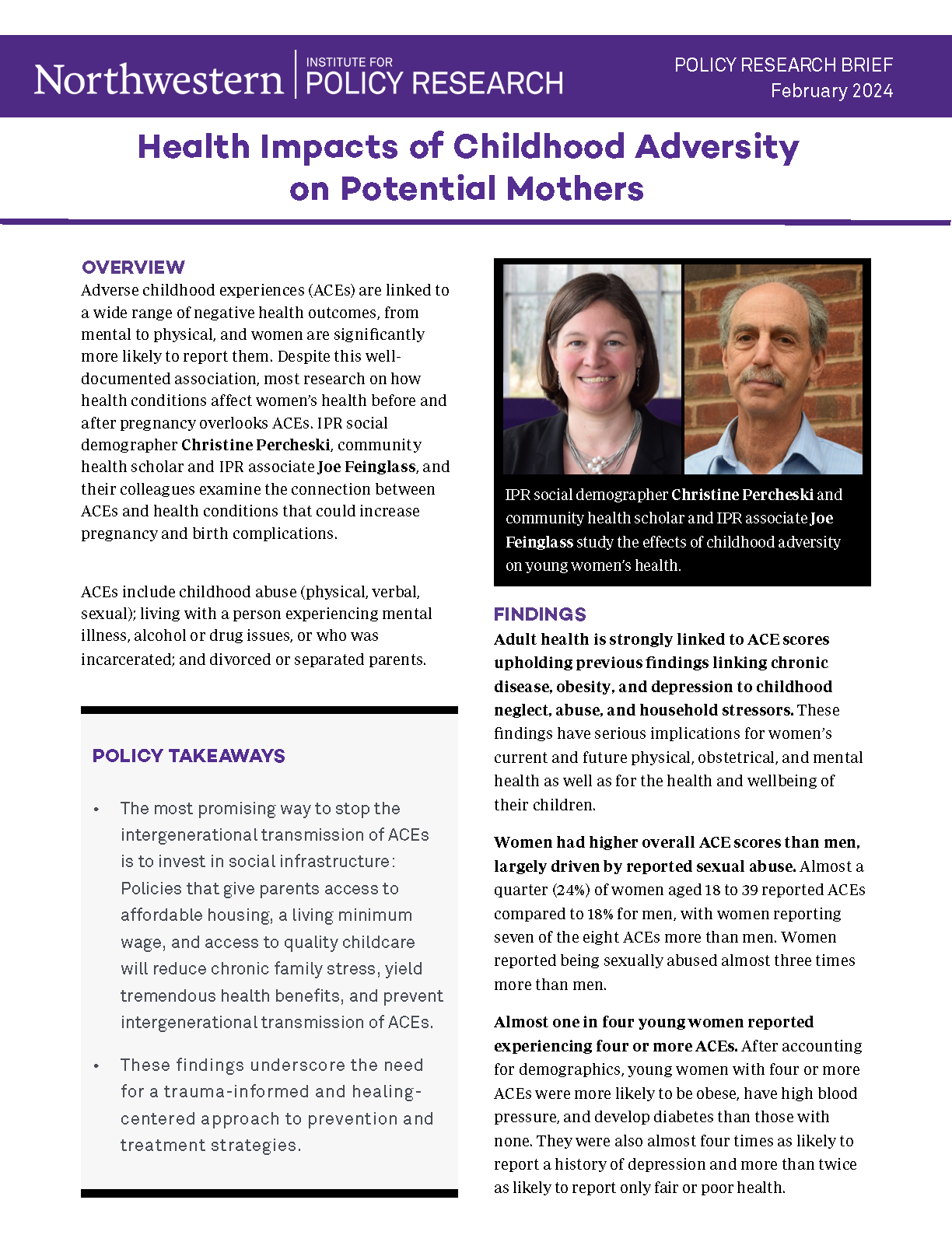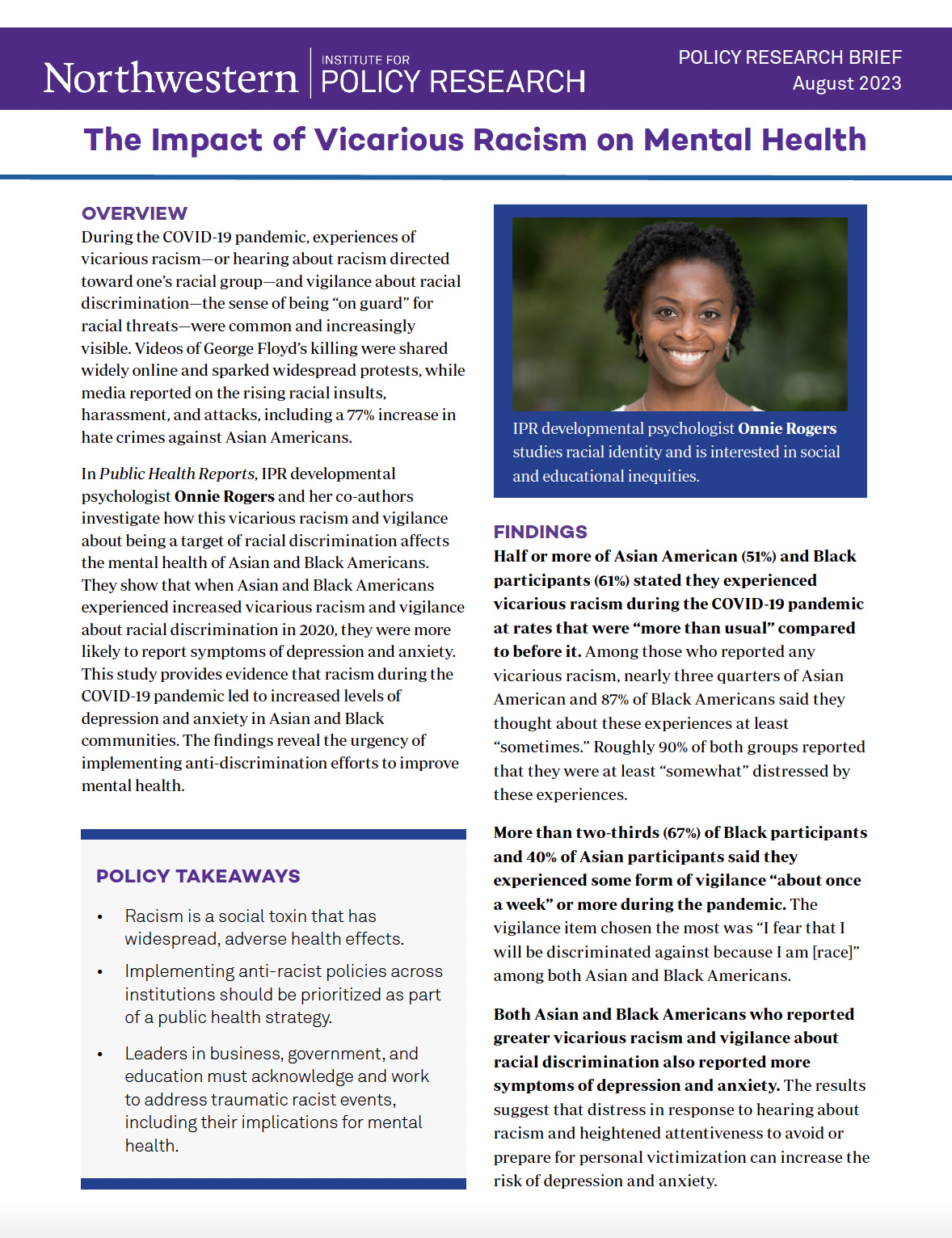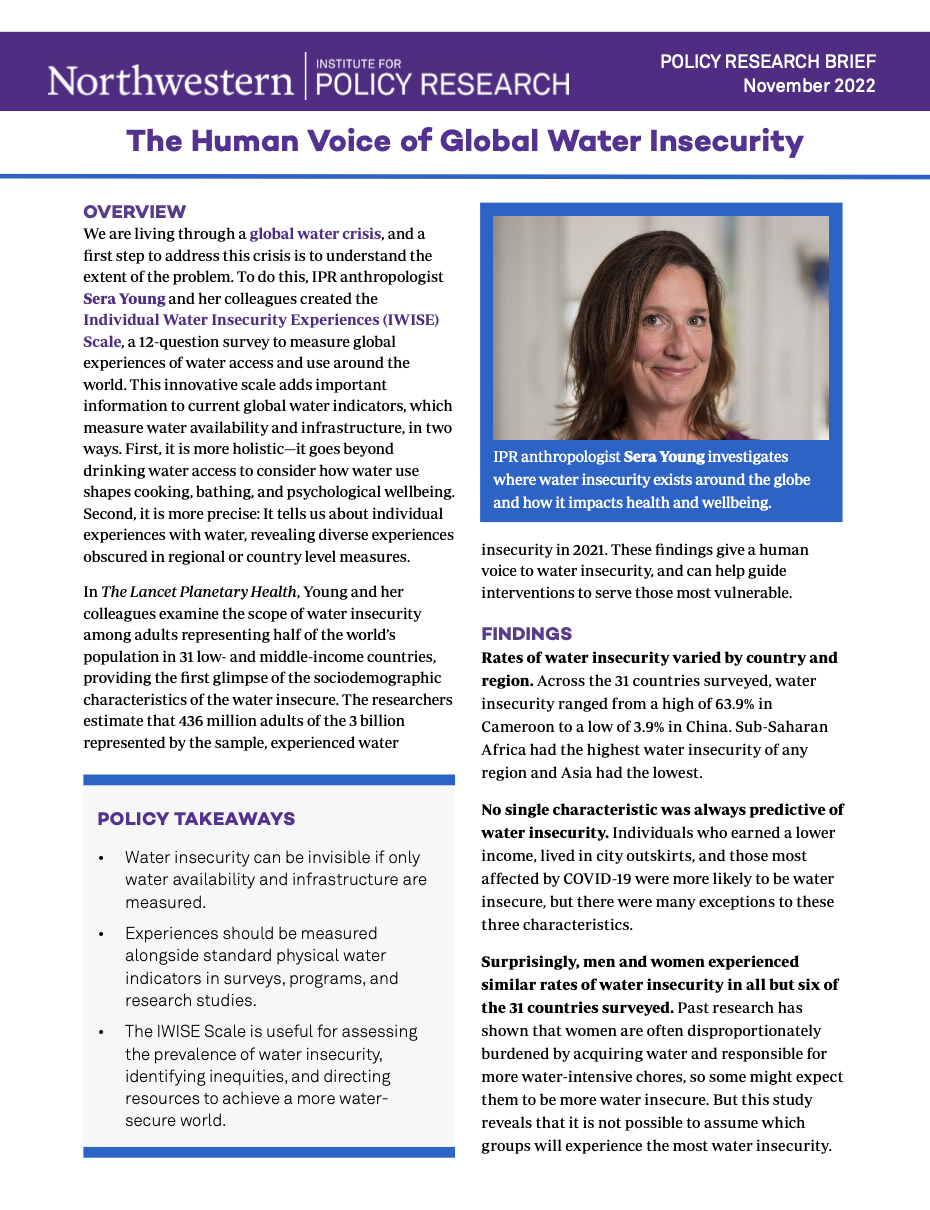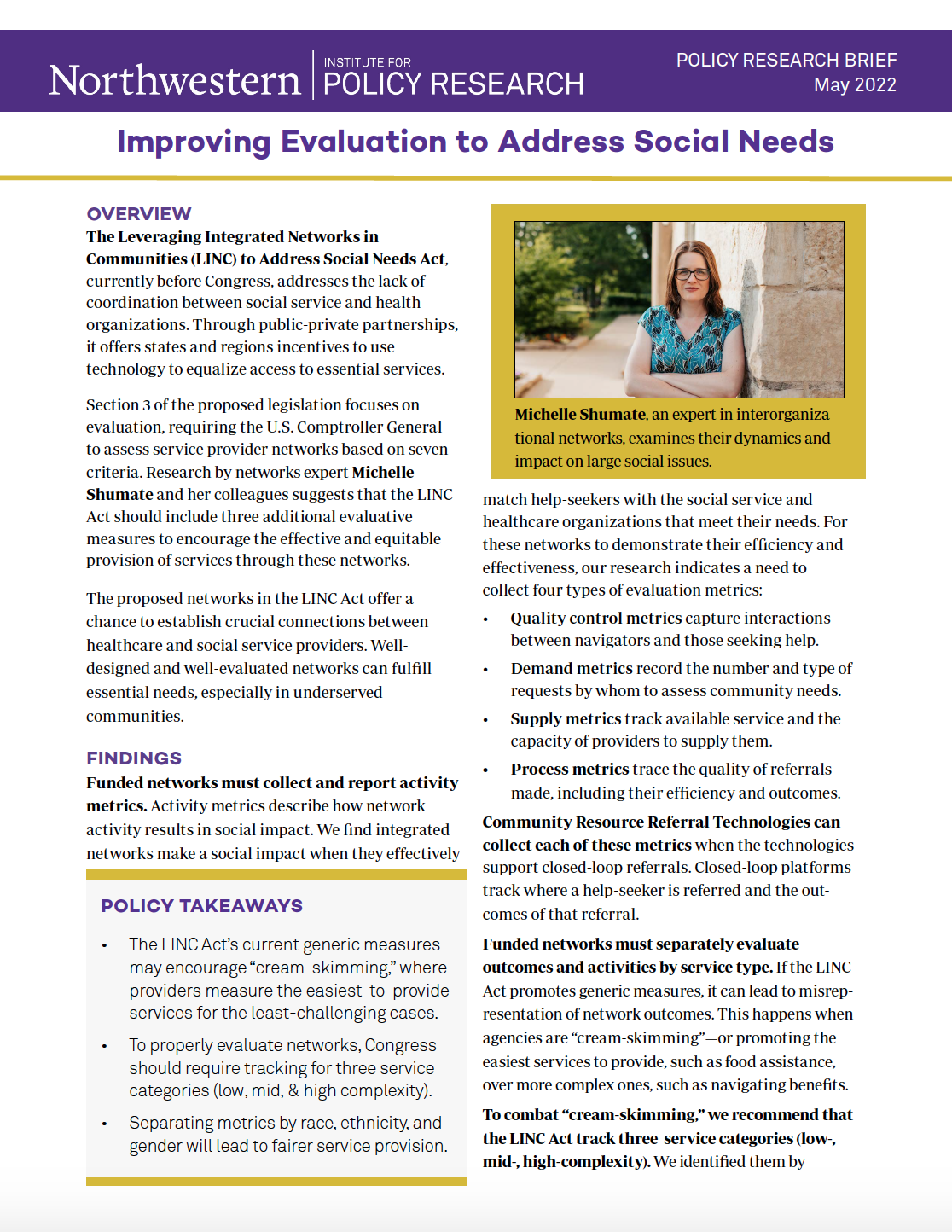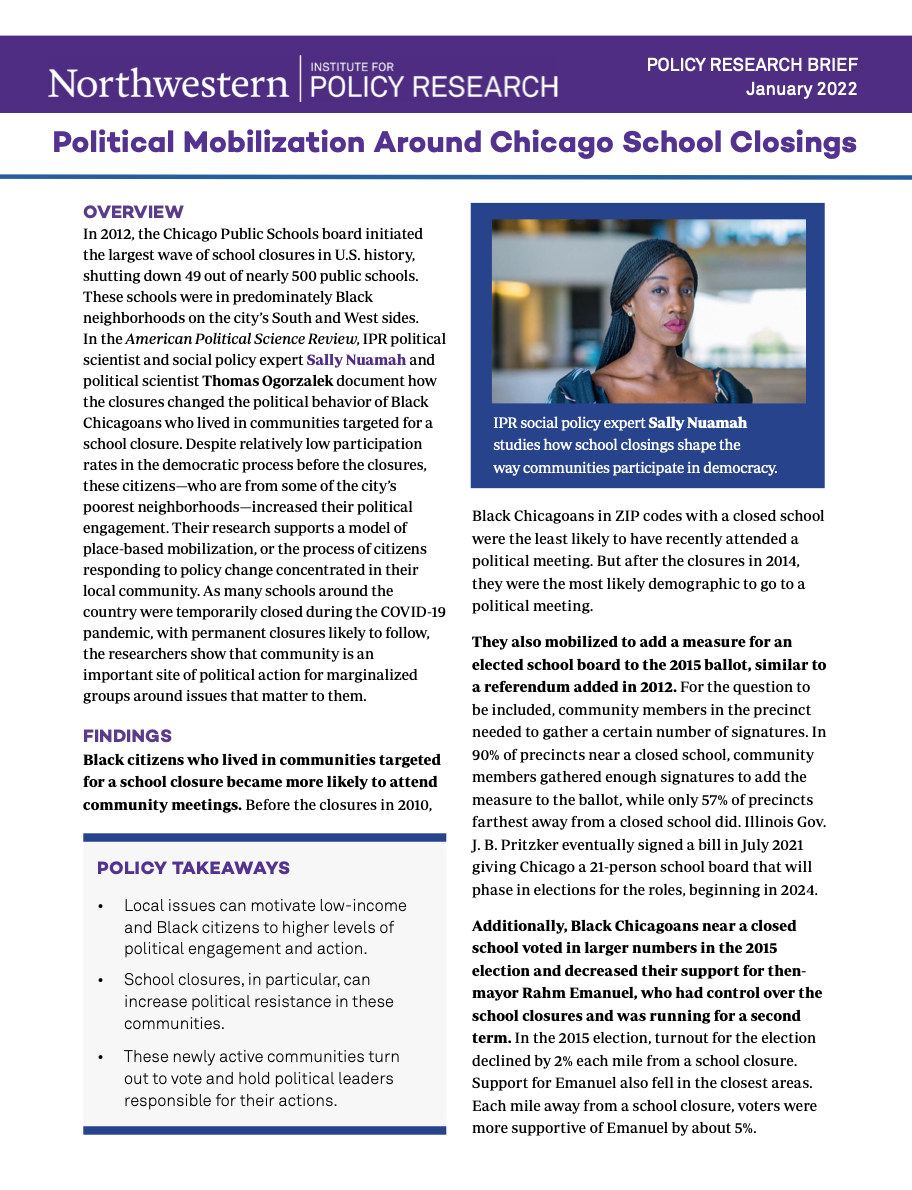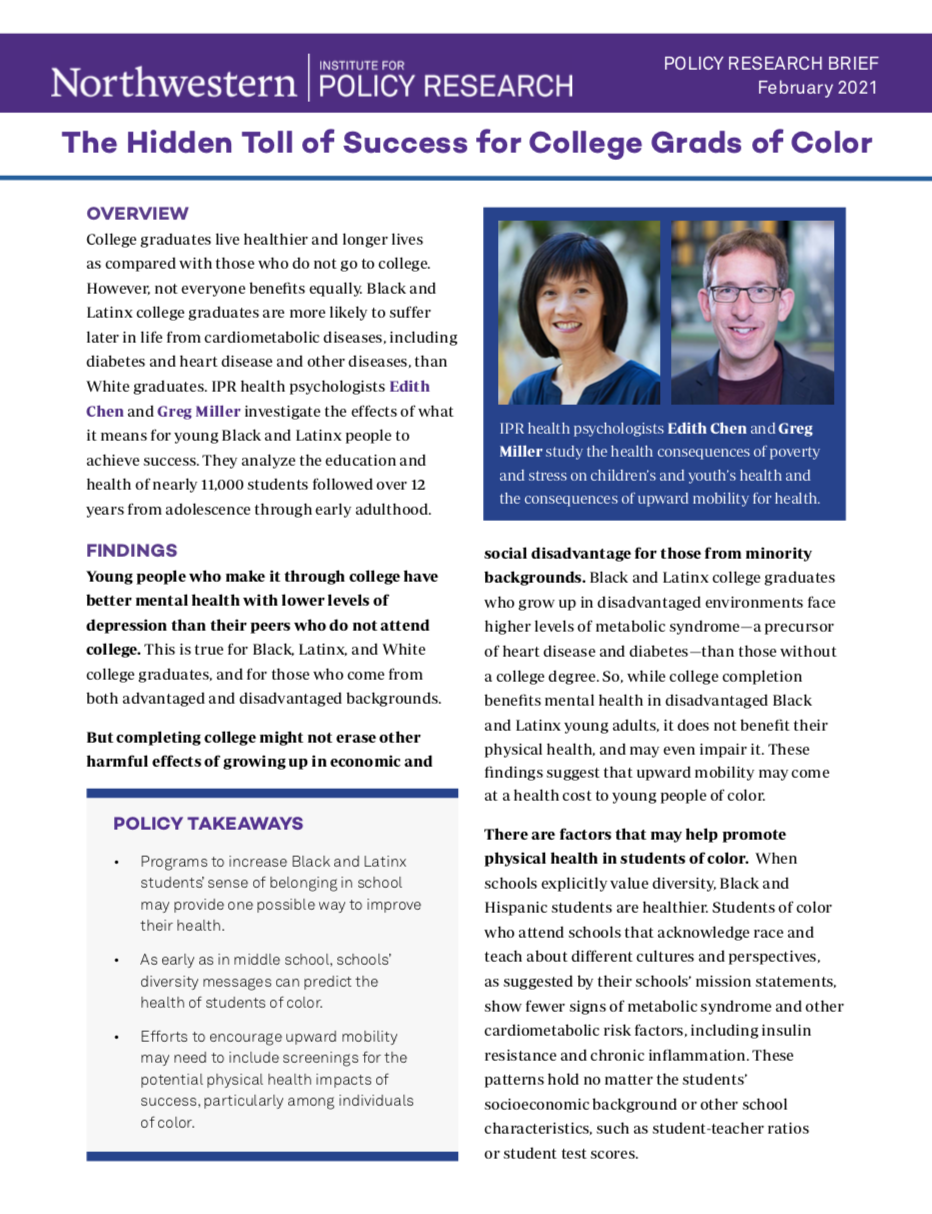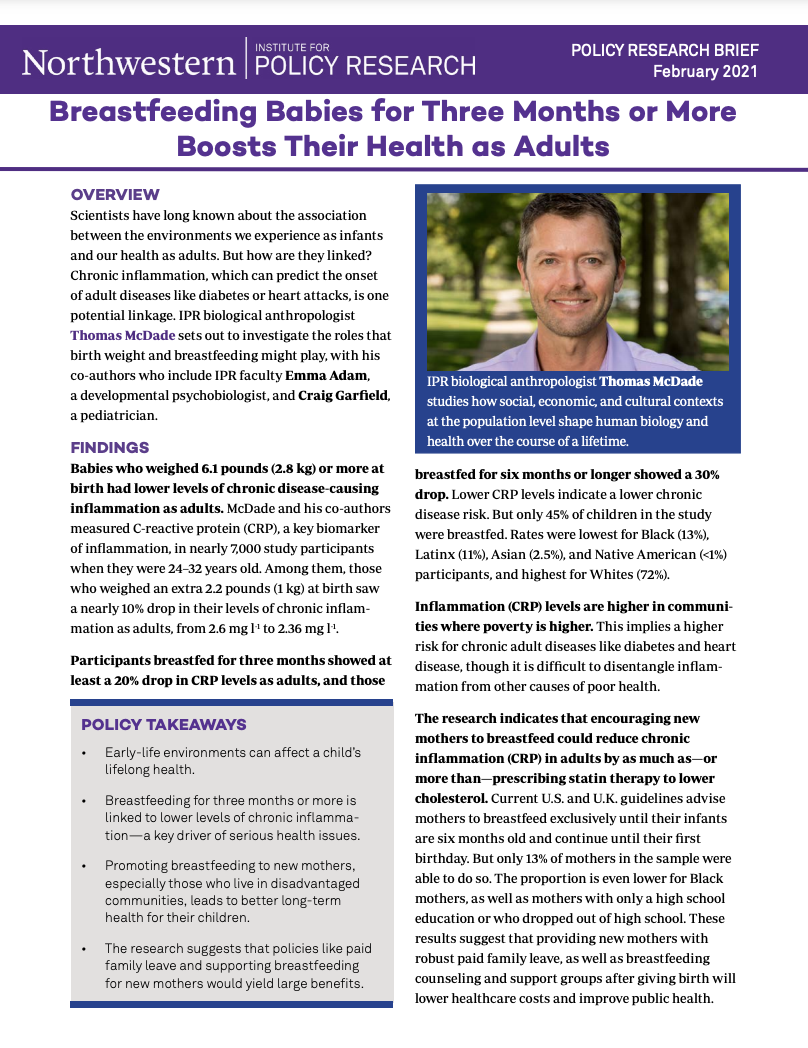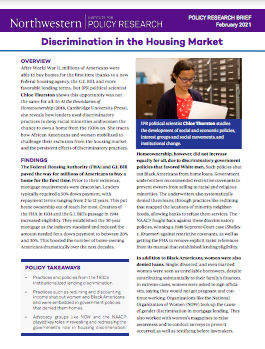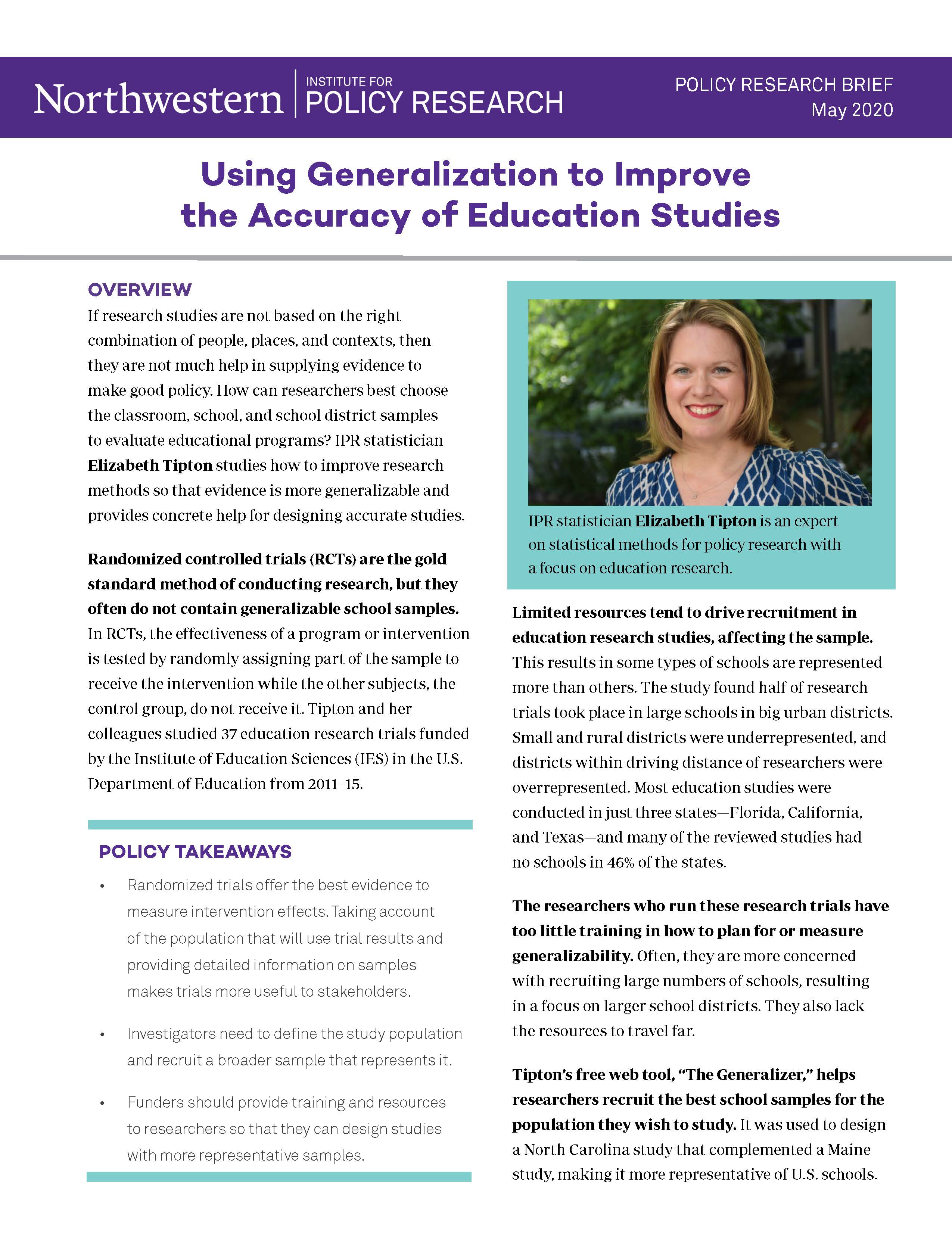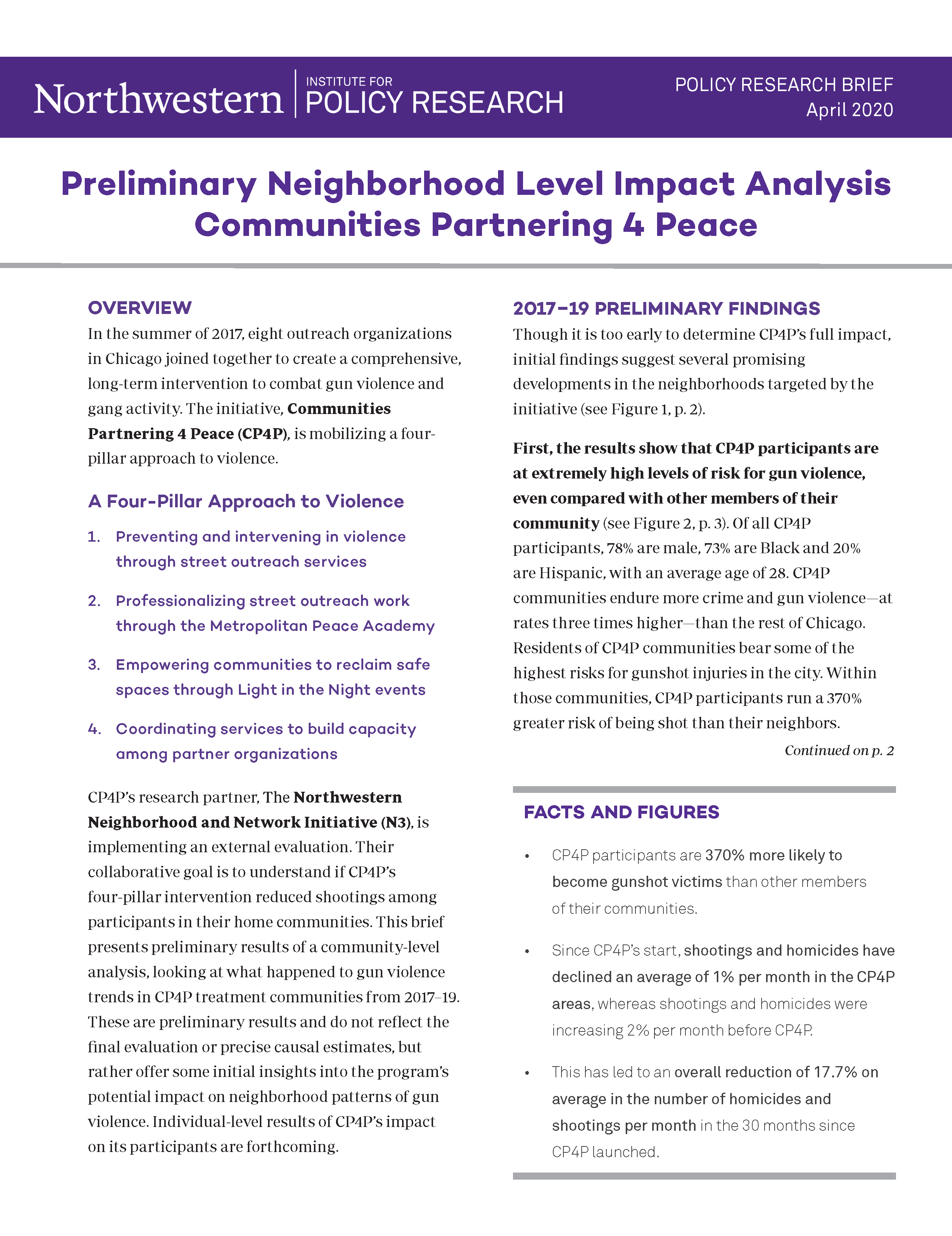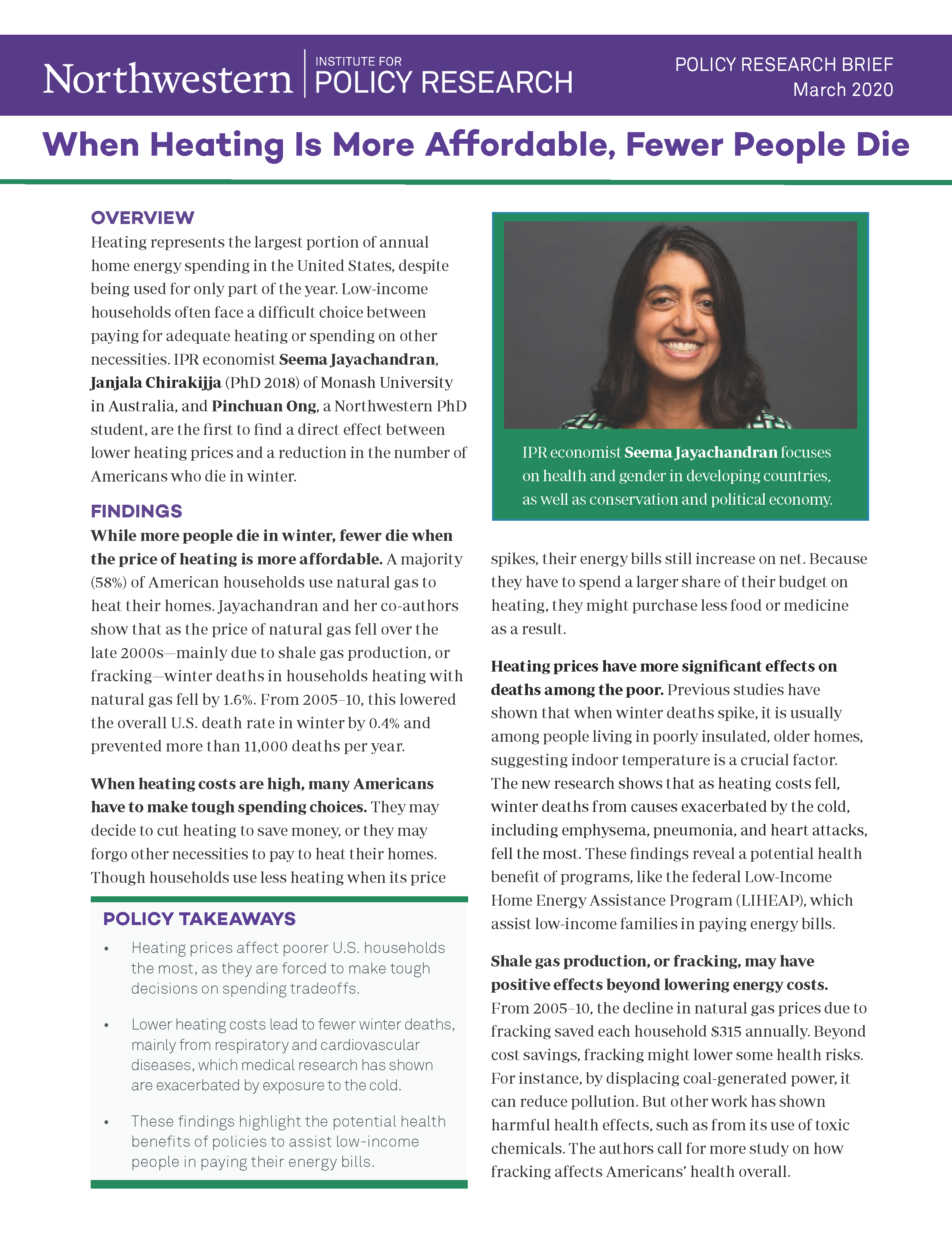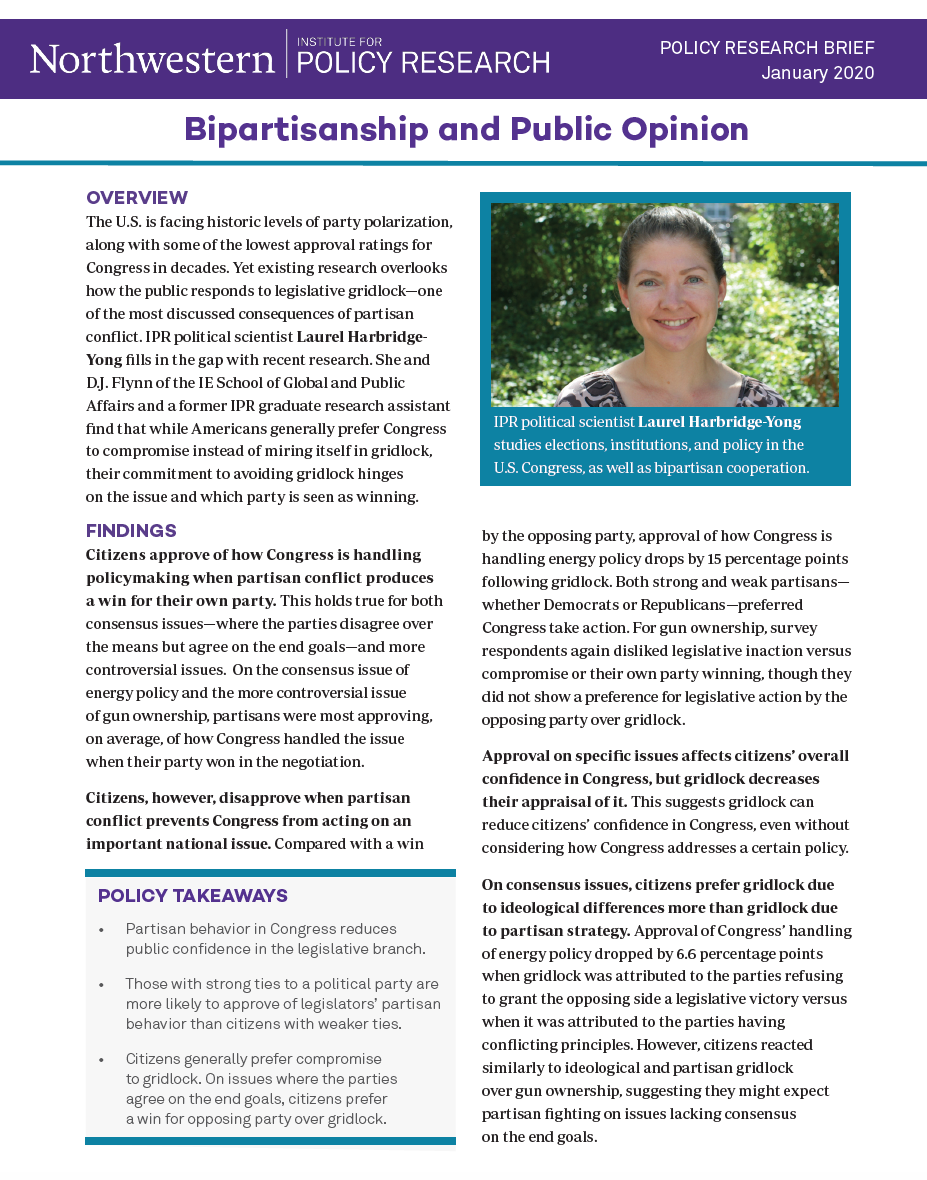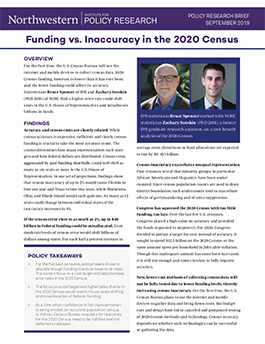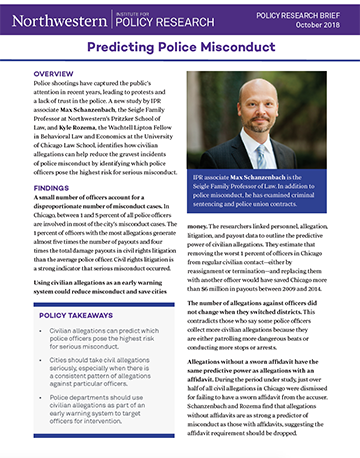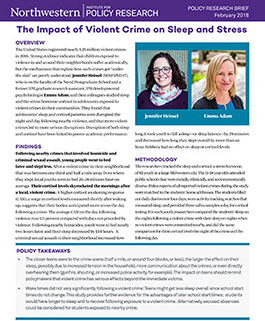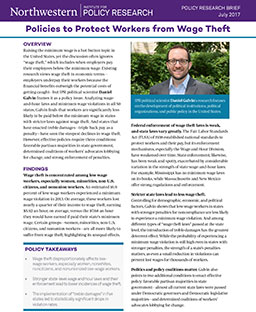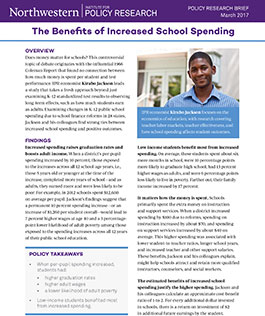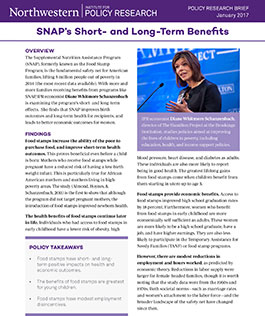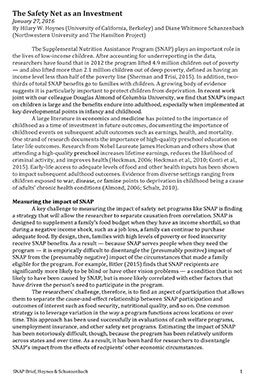Policy Briefs
Browse policy briefs below or find more briefs in our archive.
2025
Differential Privacy's Trade-Offs Matter for Policy Use
By Priyanka Nanayakkara and Jessica Hullman
Policymakers and others who make data-driven decisions often need to share data summaries without violating the privacy of the individuals in the dataset. Differential privacy (DP) is a leading standard that protects privacy by adding statistical noise during computation of outputs—but it can reduce accuracy. Priyanka Nanayakkara (PhD 2024) and IPR computer scientist Jessica Hullman outline the trade-offs of using differentially private data to evaluate policy. They argue that DP is not a one-size-fits-all solution. When considering DP, agencies should weigh privacy, data utility, transparency, and fairness, and work closely with data scientists to ensure DP aligns with public values and policy goals.
Read the brief
Why Colorblind Policies Fail to Achieve Meritocracy
By Chika Okafor
The Supreme Court’s 2023 decision ending race-conscious affirmative action—and the broader push for “colorblind” policies—has reignited debate about what fairness really means in American opportunity. In a study of referral hiring, IPR economist and legal scholar Chika Okafor finds that unequal outcomes persist even when all candidates have equal qualifications and employers ignore race. The reason lies in people’s social networks: Individuals tend to connect with others who resemble themselves, and minorities’ social groups are smaller. This dynamic—what Okafor calls social network discrimination—gives members of larger groups greater access to opportunities in jobs, housing, and education.
Read the brief
How School Shootings Impact Students' Mental Health
By Max Pienkny, Maya Rossin-Slater, Molly Schnell, and Hannes Schwandt
Since the Columbine shooting in 1999, more than 394,000 students have witnessed gun violence at school. IPR economists Molly Schnell and Hannes Schwandt, Northwestern economics doctoral student Max Pienkny, and Stanford economist Maya Rossin-Slater explore how school shootings affect students’ mental health in a study in AEA Papers and Proceedings. They show that after a school shooting that resulted in at least one death, surviving students’ use of medications for conditions such as anxiety and depression increased by more than 25% and stayed high for up to five and a half years.
Read the brief
2024
Guided Conversations Help Reduce Kids’ Racial Bias
By Sylvia Perry
Experts encourage parents to have open conversations about race and racism with their kids, but many White parents fail to have them— sometimes because they fear that talking about race will make their children more biased. In a study published in Developmental Psychology, IPR psychologist Sylvia Perry and her colleagues examine how guided conversations between White parents and their kids about race affect their children’s attitudes toward Black people. They find that when parents used color-conscious language to discuss videos depicting incidents of subtle and blatant racism with their 8- to 12-year-old kids, their children’s anti-Black bias decreased.
Read the brief
Health Impacts of Childhood Adversity on Potential Mothers
By Christine Percheski and Joe Feinglass
Adverse childhood experiences (ACEs) are linked to a wide range of negative health outcomes, from mental to physical, and women are significantly more likely to report them. Despite this welldocumented association, most research on how health conditions affect women’s health before and after pregnancy overlooks ACEs. IPR social demographer Christine Percheski, community health scholar and IPR associate Joe Feinglass, and their colleagues examine the connection between ACEs and health conditions that could increase pregnancy and birth complications.
Read the brief
2023
The Impact of Vicarious Racism on Mental Health
By Onnie Rogers
During the COVID-19 pandemic, experiences of vicarious racism and vigilance about racial discrimination were common and increasingly visible. In Public Health Reports, IPR developmental psychologist Onnie Rogers and her co-authors investigate how this vicarious racism and vigilance about being a target of racial discrimination affects the mental health of Asian and Black Americans. They show that when Asian and Black Americans experienced increased vicarious racism and vigilance about racial discrimination in 2020, they were more likely to report symptoms of depression and anxiety.
Read the brief
2022
The Human Voice of Global Water Insecurity
By Sera Young, Hilary Bethancourt, Zaccary Ritter, and Edward Frongillo
We are living through a global water crisis, and a first step to address this crisis is to understand the extent of the problem. In The Lancet Planetary Health, IPR anthropologist Sera Young and her colleagues examine the scope of water insecurity among adults representing half of the world’s population in 31 low- and middle-income countries, providing the first glimpse of the sociodemographic characteristics of the water insecure. The researchers estimate that 436 million adults of the 3 billion represented by the sample, experienced water insecurity in 2021.
Read the brief
Improving Evaluation to Address Social Needs
By Michelle Shumate, Valerie Gruest, Julia Carboni, and Amanda Bankston
The Leveraging Integrated Networks in Communities (LINC) to Address Social Needs Act, currently before Congress, addresses the lack of coordination between social service and health organizations. Through public-private partnerships, it offers states and regions incentives to use technology to equalize access to essential services. Research by networks expert Michelle Shumate and her colleagues suggests that the LINC Act should include three additional evaluative measures to encourage the effective and equitable provision of services through these networks.
Read the brief
Political Mobilization Around Chicago School Closings
By Sally Nuamah and Thomas Ogorzalek
In 2012, the Chicago Public Schools board initiated the largest wave of school closures in U.S. history, shutting down 49 out of nearly 500 public schools. These schools were in predominately Black neighborhoods on the city’s South and West sides. IPR political scientist and social policy expert Sally Nuamah and political scientist Thomas Ogorzalek document how the closures changed the political behavior of Black Chicagoans who lived in communities targeted for a school closure. Despite relatively low participation rates in the democratic process before the closures, these citizens—who are from some of the city’s poorest neighborhoods—increased their political engagement.
Read the brief
2021
The Hidden Toll of Success for College Grads of Color
By Edith Chen and Greg Miller
College graduates live healthier and longer lives as compared with those who do not go to college. However, not everyone benefits equally. Black and Latinx college graduates are more likely to suffer later in life from cardiometabolic diseases, including diabetes and heart disease and other diseases, than White graduates. IPR health psychologists Edith Chen and Greg Miller investigate the effects of what it means for young Black and Latinx people to achieve success. They analyze the education and health of nearly 11,000 students followed over 12 years from adolescence through early adulthood.
Read the brief
Breastfeeding Babies for Three Months or More Boosts Their Health as Adults
By Thomas McDade
Scientists have long known about the association between the environments we experience as infants and our health as adults. But how are they linked? Chronic inflammation, which can predict the onset
of adult diseases like diabetes or heart attacks, is one potential linkage. IPR biological anthropologist Thomas McDade sets out to investigate the roles that birth weight and breastfeeding might play in adult health. He and his colleagues show that infants who breastfed for three months or more had substantial reductions in levels of inflammation, a key driver serious health issues, in adulthood.
Read the brief
Discrimination in the Housing Market
By Chloe Thurston
Have government housing practices been fair for everyone? After WWII, millions of Americans bought homes for the first time thanks to the standardization of 30-year mortgages. IPR political scientist Chloe Thurston explains how many minorities and women were shut out of the housing market due to discriminatory government policies and how they fought for homeownership through advocacy groups like the NAACP and NOW.
Read the brief
2020
Using Generalization to Improve the Accuracy of Education Studies
By Elizabeth Tipton, Jessaca Spybrook, Katie Fitzgerald, Qian Wang, and Caryn Davidson
If research studies are not based on the right combination of people, places, and contexts, then they are not much help in supplying evidence to make good policy. How can researchers best choose the classroom, school, and school district samples to evaluate educational programs? IPR statistician Elizabeth Tipton studies how to improve research methods so that evidence is more generalizable and provides concrete help for designing accurate studies.
Read the brief
Preliminary Neighborhood Level Impact Analysis Communities Partnering 4 Peace
By Andrew V. Papachristos, Sushmita V. Gopalan, Rose Werth, Dawna Leggett, and David Hureau
In the summer of 2017, eight outreach organizations in Chicago joined together to create a comprehensive, long-term intervention to combat gun violence and gang activity. The initiative, Communities Partnering 4 Peace (CP4P), is mobilizing a four-pillar approach to violence. This brief presents preliminary results of a community-level analysis, looking at what happened to gun violence trends in CP4P treatment communities from 2017–19.
Read the brief
When Heating Is More Affordable, Fewer People Die
By Seema Jayachandran, Janjala Chirakijja, and Pinchuan Ong
Heating represents the largest portion of annual home energy spending in the United States, despite being used for only part of the year. Low-income households often face a difficult choice between paying for adequate heating or spending on other necessities. IPR economist Seema Jayachandran, Janjala Chirakijja (PhD 2018) of Monash University in Australia, and Pinchuan Ong, a Northwestern PhD student, are the first to find a direct effect between lower heating prices and a reduction in the number of Americans who die in winter.
Read the brief
Bipartisanship and Public Opinion
By Laurel Harbridge-Yong and D.J. Flynn
The U.S. is facing historic levels of party polarization, along with some of the lowest approval ratings for Congress in decades. Yet existing research overlooks how the public responds to legislative gridlock—one of the most discussed consequences of partisan conflict. In a study, IPR political scientist Laurel Harbridge-Yong and D.J. Flynn of the IE School of Global and Public Affairs find that while Americans generally prefer Congress to compromise instead of miring itself in gridlock, their commitment to avoiding gridlock hinges on the issue and which party is seen as winning.
Read the brief
2019
Funding vs. Inaccuracy in the 2020 Census
By Bruce Spencer and Zachary Seeskin
The U.S. Census Bureau continues to prepare to launch the 2020 Census on April 1, as mandated by the U.S. Constitution. In a recent working paper, statisticians Bruce Spencer of IPR and Zachary Seeskin of NORC (PhD 2016) weigh the importance of taking an accurate census count versus the financial expense of gathering information for the census. They find that while census accuracy is expensive, is it crucial. The census determines how many representatives each state gets and how federal dollars are distributed. Census error, exacerbated by past funding shortfalls, could easily shift seats in the U.S. House of Representatives and misallocate billions in federal funding, due to an inaccurate count.
Read the brief
2018
Predicting Police Misconduct
By Max Schanzenbach and Kyle Rozema
Police shootings have captured the public’s attention in recent years, leading to protests and a lack of trust in the police. A new study by IPR associate Max Schanzenbach, the Seigle Family Professor at Northwestern’s Pritzker School of Law, and Kyle Rozema, the Wachtell Lipton Fellow in Behavioral Law and Economics at the University of Chicago Law School, identifies how civilian allegations can help reduce the gravest incidents of police misconduct by identifying which police officers pose the highest risk for serious misconduct
Read the brief
The Impact of Violent Crime on Sleep and Stress
By Emma Adam and Jennifer Heissel
The United States registered nearly 1.25 million violent crimes in 2016. Strong evidence indicates that children exposed to violence in and around their neighborhoods suffer academically, but the mechanisms that explain how such crimes get “under the skin” are poorly understood. Jennifer Heissel (SESP PhD 17), who is on the faculty of the Naval Postgraduate School and a former IPR graduate research assistant, IPR developmental psychobiologist Emma Adam, and their colleagues studied sleep and the stress hormone cortisol in adolescents exposed to violent crimes in their communities. They found that adolescents’ sleep and cortisol patterns were disrupted the night and day following nearby violence, and that more violent crimes led to more serious disruptions. Disruption of both sleep and cortisol have been linked to poorer academic performance.
Read the brief
2017
Policies to Protect Workers from Wage Theft
Raising the minimum wage is a hot-button topic in the United States, yet the discussion often ignores “wage theft”, which includes when employers pay their employees below the minimum wage. Existing research views wage theft in economic terms—employers underpay their workers because the financial benefits outweigh the potential costs of getting caught—but IPR political scientist Daniel Galvin frames it as a policy issue. Analyzing wage- and-hour laws and minimum wage violations in all 50 states, Galvin finds that workers are significantly less likely to be paid below the minimum wage in states with stricter laws against wage theft. And states that have enacted treble damages—triple back pay as a penalty—have seen the steepest declines in wage theft.
Read the brief
The Benefits of Increased School Spending
By Kirabo Jackson
Does money matter for schools? This controversial topic of debate originates with the influential 1966 Coleman Report that found no connection between how much money is spent per student and test performance. IPR economist Kirabo Jackson leads a study that takes a fresh approach beyond just examining K-12 standardized test results to observing long-term effects, such as how much students earn as adults. Examining changes in K-12 public school spending due to school finance reforms in 28 states, Jackson and his colleagues find strong ties between increased school spending and positive outcomes.
Read the brief
SNAP's Short- and Long-Term Benefits
By Diane Whitmore Schanzenbach
The Supplemental Nutrition Assistance Program (SNAP), formerly known as the Food Stamp Program, is the fundamental safety net for American families, lifting 5 million people out of poverty in 2014 (the most recent data available). With more and more families receiving benefits from programs like SNAP, IPR economist Diane Whitmore Schanzenbach is examining the program’s short- and long-term effects. She finds that SNAP improves birth outcomes and long-term health for recipients, and leads to better economic outcomes for women.
Read the brief
2016
The Safety Net as an Investment
The Supplemental Nutrition Assistance Program (SNAP) plays an important role in the lives of low-income children. After accounting for underreporting in the data, researchers have found that in 2012 the program lifted 4.9 million children out of poverty—and also lifted more than 2.1 million children out of deep poverty, defined as having an income level less than half of the poverty line. In addition, two-thirds of total SNAP benefits go to families with children. A growing body of evidence suggests it is particularly important to protect children from deprivation. In recent work the authors find that SNAP’s impact on children is large and the benefits endure into adulthood, especially when implemented at key developmental points in infancy and childhood.
Read the brief
